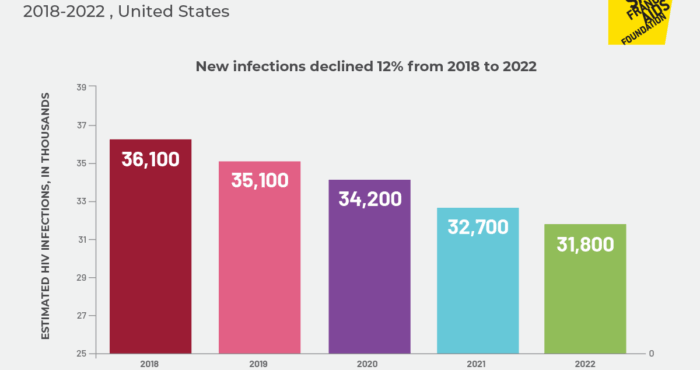New findings on inflammation & how it affects people with HIV
Previous research has shown the association between increased inflammation in people living with HIV and risk of cardiovascular events, AIDS-related complications, and mortality. New research, published in JAIDS, takes inflammation research one step further to document the relationship between inflammation and other serious health concerns for people with HIV, including kidney and liver injury and gastrointestinal inflammation.
“There is a large set of adverse events that HIV-infected individuals suffer from that appear to be associated with inflammation,” lead study author Brian Hart told BETA. “These events are relatively common and can affect length and quality of life.”
“Antiretroviral therapy has dramatically reduced AIDS-related disease and death, yet people living with HIV remain at risk of non-AIDS complications and non-communicable diseases,” said Benjamin Young, MD, PhD, senior vice president and chief medical officer of the International Association of Providers in AIDS Care (IAPAC).
People living with HIV continue to have higher levels of inflammation markers, such as interleukin-6 (IL-6), and coagulation markers, such as D-dimer, despite being on effective antiretroviral therapy (ART) with an undetectable viral load. Previous studies have associated higher levels of inflammation and coagulation markers with increased risk of mortality, cardiovascular disease (CVD) and cancer.
“It’s been known for some time that chronic inflammation is a risk factor for a variety of end-organ (or organ system) disease; this has been reported in both the general- and HIV-infected populations. In the ART era, it’s notable and of concern that among people living with HIV with viral suppression that levels of inflammation, often assessed by measuring levels of circulating biomarkers, like IL-6 or D-dimer remain higher than HIV-uninfected people,” Young noted.
Details of the study
The study used data from two large international HIV studies, the Strategies for Management of Antiretroviral Therapy (SMART) study and the Evaluation of Subcutaneous Proleukin in a Randomized International Trial (ESPRIT). A total of 3,568 individuals with viral loads below 500 copies/mL who were enrolled in SMART and ESPRIT. About 23% were women, the median age was 42, 26% reported an AIDS event before study enrollment, and the median time on treatment was five years.
The researchers looked for the occurrence of conditions known to be associated with inflammation in people living with HIV (cardiovascular disease events like heart attacks, non-AIDS related cancer, and AIDS-related conditions).
In addition, they assessed the occurrence of other grade-4 (serious or life-threatening) events including gastroenteritis, liver cirrhosis, acute kidney failure, acute pancreas inflammation, appendicitis and hepatitis C. The researchers also analyzed levels of inflammation “markers” (proteins found in the blood such as D-dimer and IL-6).
Results of the study
Out of the 3,568 participants included, 252 individuals were diagnosed with at least one AIDS-related complication, cardiovascular disease event, or non-AIDS-related cancer.
A total of 339 individuals showed signs or symptoms of a grade-4 event, which were separate than the diagnoses mentioned above. About half of these people experienced grade-4 events that were related to chronic inflammation, including: gastroenteritis, liver cirrhosis, acute kidney failure, acute pancreas inflammation, appendicitis and hepatitis C. Other grade-4 events that were not related to chronic inflammation included depression, suicide event, abdominal pain, and groin hernia.
Individuals who experienced a grade-4 event had higher median IL-6 and D-dimer levels at baseline (a finding that was statistically significant). These higher levels of inflammation were strongly associated with higher risk of experiencing a potentially life-threatening event.
Experiencing one grade-4 event significantly increased the risk of death compared to those who did not experience a grade-4 event. For individuals who experienced two or more grade-4 events, the risk of death was further increased. Out of the 339 people who experienced a grade-4 event, 252 experienced one grade-4 event, 54 experienced two events and 33 experienced three or more events.
“We classified each grade-4 event as inflammatory or not, and found that nearly half of all participants with a grade-4 event had an inflammatory event. Additionally, higher levels of IL-6 and D-dimer were associated with an increased risk of grade-4 events overall, and this association grew stronger when only considering the inflammatory events,” said Hart.
“We found that grade-4 events were more common than AIDS, CVD or non-AIDS cancer events, and that they were associated with a similar risk of death as AIDS events,” Hart said.
The study’s take-away
The researchers conclude that IL-6 and D-dimer levels are strongly associated with grade-4 events, which are in turn associated with increased risk of death.
“These findings raise the important chicken-and-eggs issue as to whether the inflammation is the cause or effect of HIV, or other underlying disease process—a yet unresolved, but important issue,” said Benjamin Young, MD, PhD, senior vice president and chief medical officer of the International Association of Providers in AIDS Care (IAPAC).
What can people living with HIV do to try and combat chronic inflammation?
Unfortunately, there’s no proven strategy to completely eliminate chronic inflammation in people living with HIV, said Young. There are some things that reduce inflammation and improve health for people living with HIV, which Young urged people to consider.
“Antiretroviral therapy clearly reduces risk of AIDS and non-AIDS mortality, curing hepatitis C virus (HCV) infection reduces inflammation and HCV-related disease and cancer, tobacco cessation reduces the risk of a wide range of disease, including cardiovascular and pulmonary disease,” said Young.
Future research, said Hart, should determine if treatments which reduce inflammatory biomarkers also lead to a reduced risk of inflammatory grade-4 events.
“Our article suggests that such treatments might impact the risk of many conditions aside from AIDS, CVD and non-AIDS cancer events. Confirmation of our findings could lead to more efficient trial designs of novel anti-inflammatory agents,” Hart concluded.
—
Source
Hart, B.B. and colleagues. Inflammation-Related Morbidity and Mortality Among HIV-Positive Adults: How Extensive Is It? JAIDS, January 2018.










